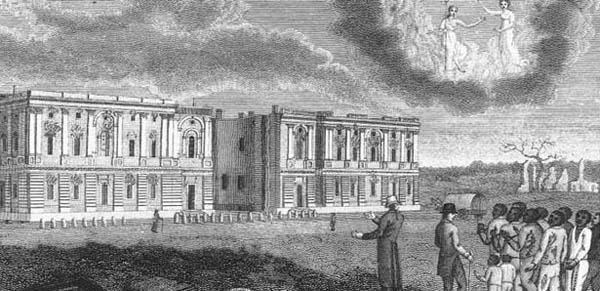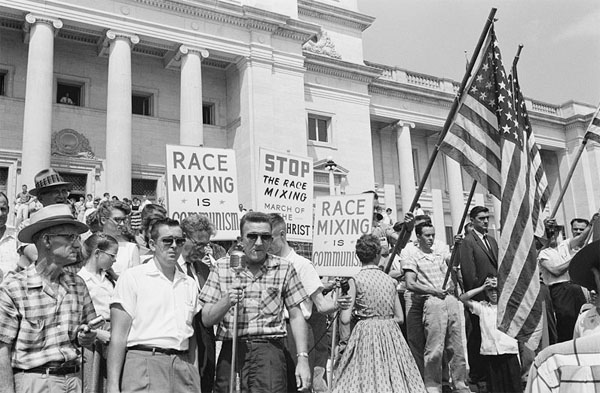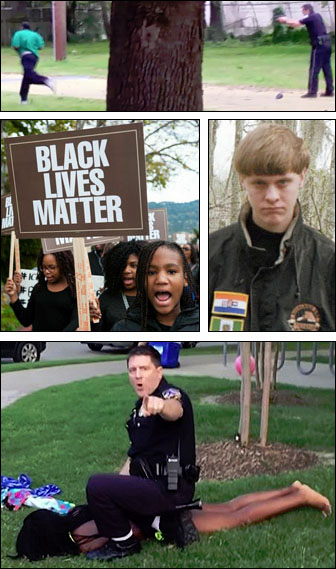OPINION
‘Land of the Free’ still far from ensuring Black Lives Matter
By JOHN BURBANK
(July 1, 2015) — As we celebrate our nation’s birthday on the Fourth of July, perhaps we should do some reflecting about our nation, especially as we consider last month’s murder of nine black citizens in South Carolina.
Our forefathers declared, “We hold these truths to be self-evident, that all men are created equal, that they are endowed by their Creator with certain unalienable Rights, that among these are Life, Liberty and the pursuit of Happiness.”
But in our Constitution, many of these same founders declared slaves to be worth three-fifths of a free person, enabled the importation of slaves for the next 20 years, and established the right of slaveholders to track down and recapture slaves who had fled to northern states.
These same founders were slaveholders themselves: Thomas Jefferson and George Washington each owned hundreds of slaves. Southern slave holders won 12 of the first 16 elections for U.S. President. Slavery was marbled into our culture and country. Indeed, racism lurks in the foundation of our very buildings, from the plantation houses featured on the state of South Carolina’s website to the U.S. Capitol, both built with the labor of slaves.

Abraham Lincoln reflected on the Civil War in his second inaugural address:
Yet, if God wills that it continue until all the wealth piled by the bondsman’s 250 years of unrequited toil shall be sunk, and until every drop of blood drawn with the lash shall be paid by another drawn with the sword, as was said 3,000 years ago, so still it must be said ‘the judgments of the Lord are true and righteous altogether.’
But the lash, the bullet, and the gun are still leveled at blacks. And while the Civil War gave us emancipation, just two decades later the white power structure took over the South through intimidation, terror, and violence. One hundred years later, when the Civil Rights Movement overturned legal segregation and enabled blacks to vote, whites fought back, with blind obeisance to the Confederate flag.

Finally that flag is coming down. But this is not just about the confederate flag. On the steps of the Alabama Capitol, there is a gold star where Jefferson Davis took the oath of office for the Confederacy. In South Carolina, state offices close every May 10 for Confederate Memorial Day to honor Confederate General “Stonewall” Jackson and Confederate President Jefferson Davis, who, like Washington and Jefferson, also owned more than 100 slaves on his plantation in Mississippi.
 Racism is not just an historical artifact from the South. It is a national disgrace, at the doorstep of white Americans, across our country. We have an economic and legal structure that systematically deprives African Americans of equal opportunity. This institutional racism reinforces, and is reinforced by, poverty, the school-to-prison pipeline, the enforced discrimination of the war on drugs, the hopelessness of life confronting a young African American as wages stagnate, tuition rises, jobs are exported, and doors close. We are far from the promise of the founders, that all are created equal, that all have the right to life, liberty and the pursuit of happiness.
Racism is not just an historical artifact from the South. It is a national disgrace, at the doorstep of white Americans, across our country. We have an economic and legal structure that systematically deprives African Americans of equal opportunity. This institutional racism reinforces, and is reinforced by, poverty, the school-to-prison pipeline, the enforced discrimination of the war on drugs, the hopelessness of life confronting a young African American as wages stagnate, tuition rises, jobs are exported, and doors close. We are far from the promise of the founders, that all are created equal, that all have the right to life, liberty and the pursuit of happiness.
In our state, black citizens are six times more likely to be incarcerated and lose their right to vote than whites. The net worth of white households is 13 times the net worth of black households. Among 4th graders, only 50% of low-income African Americans are reading at grade level. One-third of African-Americans don’t graduate from high school.
So the question before us is not merely that symbol of oppression, the Confederate flag. It is even more than the terrorist act of murder, motivated by racial hatred, in Charleston.
We must consider the acceptance and, indeed, the cultivation of an economic underclass across our country. A lesson from the South is that when workers are divided from each other by racial prejudice, and when workers are prevented from organizing together into unions — and the two go hand-in-hand — all workers’ wages suffer, as do their children. The typical wage in South Carolina is less than $15. More than 27% of children live in poverty in South Carolina.
Black lives matter. And all of our lives matter when black lives matter.
 John Burbank is the executive director and founder of the Economic Opportunity Institute in Seattle. John can be reached at john@eoionline.org.
John Burbank is the executive director and founder of the Economic Opportunity Institute in Seattle. John can be reached at john@eoionline.org.





